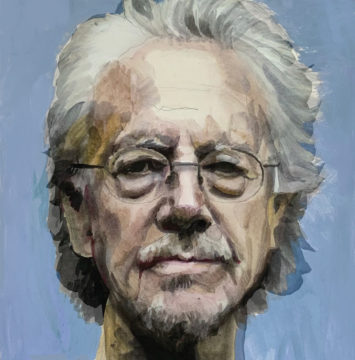David Schurman Wallace in The Nation:
 Although Handke first came to prominence as a playwright and novelist of prolific output (he’s the author of dozens of works), he has become much better known for his politics. His support for Serbia in the Balkan Wars of the 1990s, particularly his statements about the genocidal violence committed against Bosnian Muslims, has made him a pariah. A habitual contrarian, Handke embraced his outcast status and offered a bizarre disputation of the facts of the war that struck many as delusional, especially considering that he had only a glancing personal interest in Balkan politics—his mother was Slovenian, a fact he clung to with increasing intensity. In the years that followed, Handke has dug in even deeper. When Slobodan Milošević died in 2006 during his trial for war crimes, Handke spoke at his funeral. Years later, he was feted and decorated by the Serbian government. Despite the support of high-profile writers like Elfriede Jelinek and Karl Ove Knausgaard, his reputation has suffered. When he was awarded the Nobel Prize in Literature in 2019, protest was widespread and one member of the Nobel committee promptly resigned, in part because of his politics.
Although Handke first came to prominence as a playwright and novelist of prolific output (he’s the author of dozens of works), he has become much better known for his politics. His support for Serbia in the Balkan Wars of the 1990s, particularly his statements about the genocidal violence committed against Bosnian Muslims, has made him a pariah. A habitual contrarian, Handke embraced his outcast status and offered a bizarre disputation of the facts of the war that struck many as delusional, especially considering that he had only a glancing personal interest in Balkan politics—his mother was Slovenian, a fact he clung to with increasing intensity. In the years that followed, Handke has dug in even deeper. When Slobodan Milošević died in 2006 during his trial for war crimes, Handke spoke at his funeral. Years later, he was feted and decorated by the Serbian government. Despite the support of high-profile writers like Elfriede Jelinek and Karl Ove Knausgaard, his reputation has suffered. When he was awarded the Nobel Prize in Literature in 2019, protest was widespread and one member of the Nobel committee promptly resigned, in part because of his politics.
More here.
